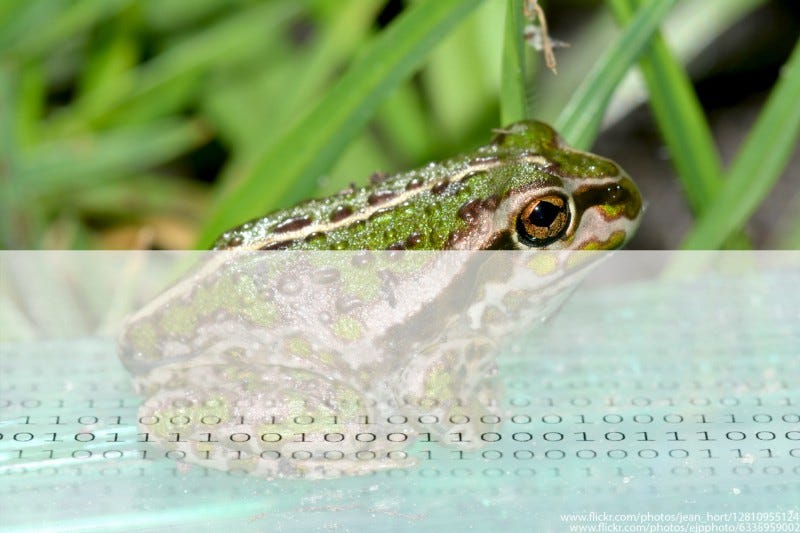The Frog in the Data Well
Surveillance is ubiquitous these days; in fact, a Soviet KGB handler would be shocked how easy it is to find out intimate details of a mark…

Surveillance is ubiquitous these days; in fact, a Soviet KGB handler would be shocked how easy it is to find out intimate details of a mark’s life. There’s no need to threaten or coerce either, though that doeshappen sometimes.
Information is central to control. We have known that for ever. Spies are the world’s second oldest profession. Much bureaucracy is about information. All those land and birth records, tax forms and license permits; what are they besides data?
The logic of data is not that different from that of the PC revolution. The totalitarian state is much like a mainframe: huge, expensive, hard to maintain and always running into one bug or the other. Further, the mainframe provider isn’t interested in improving the technology. Instead, they use the coercive power of the state to keep competition under control. A totalitarian system is an information monopoly.
Unfortunately, that monopoly doesn’t like competition, so it doesn’t allow other purveyors of information to set up shop. No google in China. It also means that frivolous collectors of information don’t find fertile ground — matchmaking sites, hook-up apps, stock prediction markets, none of these can exist as autonomous entities. Of course the actual reality of China is different, but that’s because the state has a fine grained view of information that it cares about and information that it doesn’t. Maoist China wouldn’t have allowed that subtlety.
Universal Surveillance
In comparison, contemporary data collection is like the PC. It’s fast, cheap (and almost certainly) out of control. It’s not big brother and it’s all the more efficient and powerful for it. Once data collection becomes fast and cheap, we can use it for the every frivolous or creepy purpose that comes to mind. Want to know how much you’re eating: there’s an app for that. Want to know where your children are tonight: there’s an app for that too.
Perhaps even more importantly, it makes surveillance a universal reflex. Are you worried that your child is safe? Install a camera at home and inspect the baby-sitter. Afraid that terrorists are coming in? Put a camera on every inch of every border. Worried that your workers are talking too much at the water cooler: put electronic tags on them and measure what they do.
Cheap data makes it possible to universalize information gathering to every sphere of our lives, from our dreams to daily workouts to defense contracts. That universalization, strangely, makes surveillance less ominous. You’ll probably freak out if you knew someone was tracking whom you meet, where you eat and where you sleep. But if that someone was also tracking every yawn and every burp and every little tic in your left eye, you might think it’s too banal to worry about. Arendt might have something to say about our current situation.
Decentralization is Key
Every transaction once conducted on faith is now being replaced by surveillance, and we are all doing it. This new form of spying is worse in the long term than the older kind because it’s more likely to pass off as the natural, decent thing to do. It hits all the right registers: it’s decentralized, it’s voluntary and open. It also changes us from the inside, so that we don’t need to be told to snoop on our neighbors. The logical outcome is an atomized society glued together by data rather than trust. We are like the frogs in the data well, smiling as the surveillance meter rises; but at some point it’s going to boil and we will be cooked.


